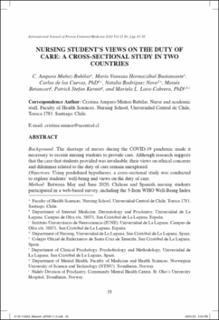Nursing student's views on the duty of care: A cross-sectional study in two countries
Muñoz-Rubilar, C. Amparo; Bustamantea, María Vanessa Hormazábal; De Las Cuevas, Carlos; Novo, Natalia Rodríguez; Betancort, Moisés; Kermit, Patrick Stefan; Lara Cabrera, Mariela Loreto
Peer reviewed, Journal article
Accepted version
Permanent lenke
https://hdl.handle.net/11250/3114970Utgivelsesdato
2023Metadata
Vis full innførselSamlinger
- Institutt for psykisk helse [1197]
- Publikasjoner fra CRIStin - NTNU [37221]
Originalversjon
The International Journal of Person Centered Medicine. 2023, 11 (2), 35-50. https://doi.org/10.5750/ijpcm.v11i2.1082Sammendrag
ABSTRACT Background: The shortage of nurses during the COVID-19 pandemic made it necessary to recruit nursing students to provide care. Although research suggests that the care that students provided was invaluable, their views on ethical concerns and dilemmas related to the duty of care remain unexplored. Objectives: Using predefined hypotheses, a cross-sectional study was conducted to explore students’ well-being and views on the duty of care. Method: Between May and June 2020, Chilean and Spanish nursing students participated in a web-based survey, including the 5-Item WHO Well-Being Index (WHO-5) and views on the duty of care reported through a scale related to beliefs about pandemics. Student’s t-test, Mann–Whitney U test, χ2 tests, and multivariable log-linear analysis were used to explore differences between nursing students in Spain and Chile and to examine the relationships between categorical variables. Results: Students (N = 183) from both countries self-reported low levels of psychological well-being (WHO-5, M = 10.8, SD = 4.3). Concerning ethical statements, although most students from both countries (71%) agreed that nurses and doctors have a duty of care, significant differences were found concerning the statement that every healthcare worker has a duty to work during a health emergency (39% agreement in Chile and 74% in Spain; p < 0.001). Conclusions: Students reported emotional and ethical challenges associated with the pandemic. Besides receiving help to deal with ethical challenges and given that a significant proportion of students from both countries reported low well-being, we recommend developing strategies to mitigate and enhance students’ well-being.

